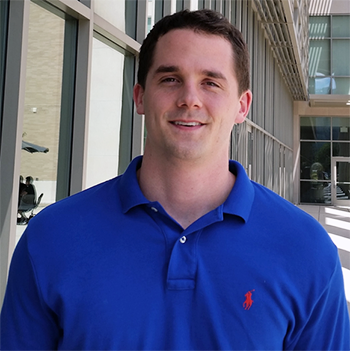 Landon Nash, graduate student in the Department of Biomedical Engineering at Texas A&M University, has been named recipient of the Best Student Paper Award at the 9th IEEE International Conference on Nano/Molecular Medicine and Engineering (IEEE-NANOMED).
Landon Nash, graduate student in the Department of Biomedical Engineering at Texas A&M University, has been named recipient of the Best Student Paper Award at the 9th IEEE International Conference on Nano/Molecular Medicine and Engineering (IEEE-NANOMED).
Nash, who conducts research as part of the Biomedical Device Laboratory headed by Professor Duncan Maitland, was recognized for his research focusing on a surface modification technique that increases the delivery time and clinical feasibility of catheter-based devices used to treat brain aneurysms.
Nash’s presentation detailed information from his research article “Characterization of Plasma Deposited Hydrocarbon Diffusion Barriers for Embolic Foam Devices,” which is in press with the scientific journal IEEE Transactions on Nanobioscience.
Nash’s surface modification approach makes use of plasma-deposited hydrocarbon diffusion barriers that delay the moisture absorption rate of shape memory polymer foams (SMPs) without altering their thermo-mechanical properties. This allows physicians a greater degree of control over the foams’ rate of expansion so that the foams can be delivered to targeted areas via a microcatheter and healing of the aneurysm can begin, Nash explains.
The Biomedical Device Laboratory, Maitland notes, develops a number of interventional devices including those based on SMPs. Research and development efforts include device fabrication, characterization, computational modeling, biocompatibility and functional in vivo studies, he says.
IEEE-NANOMED is one of the premier annual events organized by the IEEE Nanotechnology Council to bring together physicians, scientists and engineers from all over the world and every sector of academy and industry, working at advancement of basic and clinical research in medical and biological sciences using nano/molecular and engineering methods. IEEE-NANOMED enables practitioners to see nano/molecular medicine and engineering at work in both their own and related fields, from essential and advanced scientific and engineering research and theory to translational and clinical research.
About the Department of Biomedical Engineering
Committed to solving the world’s greatest health problems through the exploration of new ideas, integrated research and innovation, the Department of Biomedical Engineering at Texas A&M is producing the next generation of biomedical engineers, developing new technologies and new jobs, and achieving revolutionary advancements for the future of health care. The department has unique strengths in regenerative engineering, medical augmentation, molecular diagnostics/theranostics, tele-health, and precision medicine, and its faculty members are internationally recognized with collaborative relationships that span engineering, physical and natural sciences, medicine and veterinary sciences.